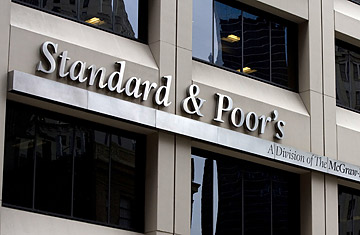
The Standard & Poor's sign is displayed outside of the headquarters in New York.
(2 of 2)
That idea is similar to one put forth in a recently published book of economic-policy proposals written by professors at New York University's Stern School of Business. Under their system, a company that wanted to have its debt rated would pay a fee to a government-run centralized clearing platform, which would then pick a ratings firm. Firms, again, would be evaluated on the accuracy of their ratings over time. "It breaks the conflict of interest," says Matthew Richardson, a professor of applied financial economics at Stern.
But some finance experts think that by focusing the discussion on who pays for ratings, a much larger issue is missed entirely. Since the 1930s, regulators themselves have relied on the judgment of private ratings agencies — thus giving the companies exalted status and immunizing them from competition that might otherwise keep them honest. It started with bank regulators in 1936, and over the years different parts of the government, overseeing everything from insurance companies to money market mutual funds, have turned to the ratings agencies for guidance. (Vote for the 2009 TIME 100 Finalists.)
The intentions were good. Ratings were a tool for assessing the safety of financial institutions. But the result has been to create a system in which getting a rating of a particular level is equivalent to "a regulatory license — a key that unlocks the markets," says Frank Partnoy, a law professor at the University of San Diego. In 1975, the SEC, in an effort to better define who was a legitimate rater of bonds, designated certain firms "nationally recognized statistical rating organizations" (NRSROs). Today, if you are a bank or a pension fund or an insurance company you have a firm grasp of the safety of your bond holdings — they're as safe as an NRSRO has told you they are.
Except, of course, if they aren't. We now have ample evidence of how that comes to pass.
So some finance experts argue that the real answer to problems with ratings agencies is to get rid of the notion that an NRSRO sign-off is the gold standard. To literally delete it from regulations. In other words, to make finance firms and investment vehicles justify — either through their own due diligence or ratings they themselves have paid for — why their holdings meet regulatory requirements.
In fact, the SEC proposed a version of that in July. The agency suggested changing a number of its ratings-based regulations since the use of the NRSRO designation "may have encouraged investors to place undue reliance on the credit ratings issued by these entities." One example: money market mutual funds, which are currently only allowed to hold high-grade paper. High-grade — as defined by the ratings agencies. In comments responding to the proposed rule change, sellers of money market funds balked at the idea of not being able to use the ratings agencies' opinions as a way to get the regulatory greenlight. That proposed rule hasn't gone anywhere.
At least not so far. We haven't yet heard the last word on ratings agencies.
